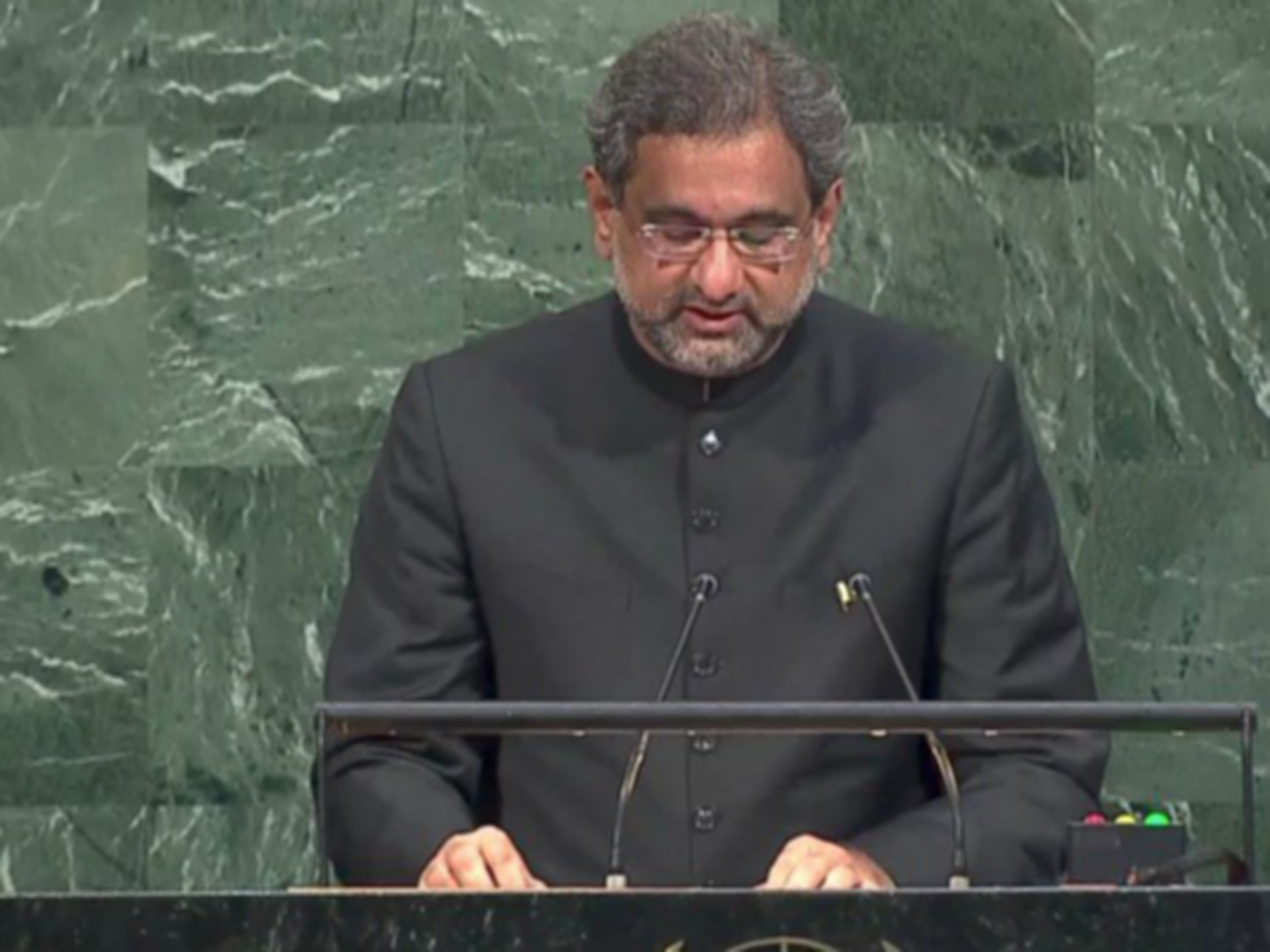Pakistan won’t be a ‘scapegoat’ in Afghan war, PM Abbasi tells UN General Assembly
Prime Minister Shahid Khaqan Abbasi addresses the United Nations General Assembly on Thursday 21st September, 2017. Pakistan refuses to be a “scapegoat” for Afghanistan’s bloodshed or to fight wars for others, Prime Minister Shahid Khaqan Abbasi told the United Nations. Addressing the UN General Assembly, Abbasi did not explicitly criticise US President Donald Trump’s new strategy on Afghanistan and South Asia but made clear his displeasure with the renewed onus on Pakistan.
“Having suffered and sacrificed so much due to our role in the global counter terrorism campaign, it is especially galling for Pakistan to be blamed for the military or political stalemate in Afghanistan,” Abbasi said. “We are not prepared to be anyone’s scapegoat,” he said. “What Pakistan is not prepared to do is to fight the Afghan war on Pakistan’s soil. Nor can we endorse any failed strategy that will prolong and intensify the suffering of the people of Afghanistan and Pakistan and other regional countries,” he said.
PM Abbasi said that 27,000 Pakistanis have been killed by extremists since the launch of the US war on terror after the September 11, 2001 attacks. We have fought the war against terror with our own resources. Pakistan’s economic losses are estimated at over $120 billion.
Yet, we remain committed to fully implementing our National Action Plan against terrorism and extremism. Defeating terrorist violence is vital to realize our overriding priority of rapid economic and social development.
Afghanistan
He called for a priority on eliminating extremists, including from the militant Islamic State (IS) group and Al Qaeda, in Afghanistan but ultimately a political solution with the Taliban. US and Afghan officials have long accused Pakistan of playing a double game and maintaining ties with extremists. Trump, unveiling a new strategy last month, pledged to take a tougher line on Pakistan making public what had long been more private US frustrations. Trump has sent thousands more US troops into Afghanistan in a bid to defeat the Taliban, reversing his previous calls to end America’s longest-ever war. Afghan President Ashraf Ghani in his own speech to the United Nations appealed to Pakistan for dialogue, saying that the neighbours can work together to eliminate extremism.
India’s human rights violations in Kashmir ‘war crimes’
Abbasi, who took office last month after his predecessor Nawaz Sharif was disqualified from office by the Supreme Court, used his UN address to renew Pakistan’s condemnation of India’s rule in held Kashmir. Accusing India of “massive and indiscriminate force” in held Kashmir, Abbasi urged an international investigation and warned of escalation on their military frontier, the Line of Control. “Pakistan has acted with restraint. But if India does venture across the LoC, or acts upon its doctrine of limited war against Pakistan, it will evoke a strong and matching response,” he said. He was referring to an Indian strategic doctrine, rarely discussed openly, of a limited military response on Pakistan that is intended to stop short of triggering a nuclear reprisal.Human rights violations by India in India-held Kashmir clearly constitute war crimes and violate the Geneva Conventions, Abbasi said, adding that India refuses to implement the UN Security Council resolution on Kashmir that mandates a UN-supervised plebiscite for the people of Jammu and Kashmir “to freely decide their destiny”. “India’s deployment of 700,000 troops in IHK to suppress Kashmiri movement is the most intense foreign military occupation in recent history,” he said, according to a tweet by Foreign Office spokesman Nafees Zakaria.
Abbasi said Pakistan urges the international community to call on India to halt pellet gun attacks on unarmed Kashmirs, stop “use of rape as instrument of state policy”, end media blackouts, rescind its “draconian emergency laws”, and free all Kashmiri political leaders.
Rohingya Muslims
The ethnic cleansing of Rohingyas is not just an affront to all norms of humanity but also challenges our collective conscience.
Middle East
The Middle East is wracked by war and violence in Syria, Iraq, Yemen and elsewhere. Although Daesh appears to have been weakened in Iraq and Syria, terrorist violence has spread and intensified across the Middle East and Africa and other parts of the world. There is no end in sight to the tragedy of Palestine. Israel’s prolonged occupation and expansion of illegal settlements may lead to renewed and wider violence in the Holy Land. Rising racism and religious hatred manifested in xenophobia and Islamophobia is erecting physical walls and psychological barriers between nations and peoples even as our world becomes increasingly interdependent.
Climate
While the pillars of world order are being eroded, the imperative of international cooperation to address poverty, disease, climate change, nuclear proliferation, terrorism and forced displacement is intensifying. Today, more than ever, we need the United Nations to provide the parameters, processes and platforms for global cooperation that is essential to address the wide ranging challenges to peace, security, and development. Pakistan welcomes the efforts launched by Secretary General Antonio Guterres to revitalize the United Nations’ capabilities in Peace and Security, Development and Management. We are also committed to reform that transforms the Security Council into a more representative, democratic and accountable body rather than an expanded club of the powerful and the privileged.


